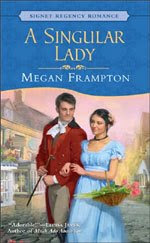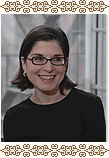Plotting By The Seat Of Your Pants
 What’s Jack up to? He’s mad because the DH put a new lock on the laundry room door so he can’t get in there and rifle though the clean towels. Sorry Dude. You must find some new trouble to get into today.
What’s Jack up to? He’s mad because the DH put a new lock on the laundry room door so he can’t get in there and rifle though the clean towels. Sorry Dude. You must find some new trouble to get into today.
This weekend I’m excited to be attending the New England Chapter of Romance Writer’s of America’s Annual Conference. On top of getting to sit down for first time face to face with my fab agent I’ll get to attend workshops with some great authors which is always pretty inspiring.
One of the inspiring authors giving a workshop this year is my own PIC (partner in crime) and author of the regency historical, A Singular Lady, Megan Frampton. Megan will be doing a workshop called Plotting by the Seat of Your Pants which I got to hear her do recently for our local New York Chapter. Listening to this workshop caused me to bug Megan for a quickie interview on plotting. Enjoy.
Hi Megan. Thanks for doing this interview. It’ll be quick and painless. I promise.
1. Tell me a little about your workshop and what made you decide to put this type of workshop together?
In the course of attending various writers’ conferences, I realized—perhaps not a rocket scientist moment on my part—that there were very few workshops for pantsers, probably because of our seat of the pants style. As I tried to figure out how to write a story, and not just pretty words strung together, I came up with some ideas to ask myself in the course of writing that don’t involve “plot,” “outline” or “stay true to the synopsis.”
[And I gotta give props to my faux critique partner, Carolyn Jewel, who worked on the outline with me. Some day we will present this workshop together, but meanwhile, buy Carolyn’s Book, My Wicked Enemy, when it comes out this summer. End of commercial.]
2. When you said, ” a writer has to decide if they really are a Pantser and not a plotter looking to get out of the work,” it made me laugh and made me think. Can you tell me what that really means? How can a writer tell if they really are a true Pantser or a Plotter?
I think true pantsers feel freest to write—and write best—when when they have only a vague story trajectory in mind. Wannabe pantsers work well with structure, but might not want to put in the advance work that pantsers do on the fly. Either way, it’s work that has to get done; it’s just a difference in when you do it.
3. Another great point you make in your workshop deals with the fact that romances always have the happily ever after and you talk about how NOT to get the character together for 400 pages. Can you talk about that concept?
Real-life romances are boring: You meet, you have a first date, it goes well, you have another one, and so on until you’re I-do-ing. Great for life, not so great for a fantastic story. The whole point, the big question the reader should be asking herself through the course of reading is not ‘when will they I do?’ but ‘how is the author possibly going to get these two together?’ THAT’s why you read. In a romance, the HEA is a foregone conclusion; it’s your job as a writer to make it less foregone, at least in the reader’s mind.
4. You also bring up the clothes line approach. Can you tell me a bit about that and how it helps the Pantser?
For me, I can write really pretty words (see above) but the scenes they’re in might not have much storyline significance. In order to make it to the final edit, you should ask yourself if the story can exist without that scene. If it can, rip it out, no matter how pretty your words are. If it can’t, keep it, and that becomes one of your clothesline items: You move from sock to sock (event to event) until you reach the end of the pole (no double entendre intended, btw). Each sock is more crucial as you advance, and you can work from one point to the next without having to know the whole wash in advance.
5. How can a Pantser feel confidant when they type THE END that they really are at the end with all the loose ends tied up neatly and completely.
Oh, for goodness’ sake, ask me a hard question, why don’t you! I have no idea. I know I feel confident that it’s done because I am COMPLETELY AND TOTALLY OVER IT, at least until I pull it out and edit it. I guess when your characters are smooching you are at the end, hopefully with ends tied. As you re-read, keep a notebook and make note of threads of plot you may or may not have tied up. Chances are you did, since your unconscious helps you, but if you didn’t, you can work it into your edit.
Ha! Don’t get mad at me. I was hoping for something divine. Humph! I guess we’ll have to keep relying on each other. Ah-hem. Ok. Back to interview mode.
6. Finally, please tell us what’s next for you.
I’ll be working on a super-sexy high-concept novella called “Fortune’s Lady” (although I might name it My Lady’s Pleasure), and then the next book in my Road series, Road to Desire. I am searching for a new agent, and am committed, for the time being, to historical, although I would love to write another contemporary (I did one that didn’t sell—yet—called Mothering Heights which is being shopped around).
Thanks for doing this PIC! See you in New England! Well, there and on the bus going there:)
About Megan:
Megan majored in English literature at Barnard College with a double minor in political science and religion. She worked in the music industry for 15 years, editing and writing music reviews for a music industry trade magazine. Eventually, she became the Editor-in-Chief and went on to develop music industry conference programs.
Megan married one of her former interns and lives in Brooklyn, NY, with him and her son. Now that she stays at home, Megan has returned to reading — and writing — the fiction that was her first love. She is a member and was President of the Beau Monde (2004-2005), the Regency chapter of the Romance Writers of America, and a member of the NYC chapter of the RWA as well. Find out more about Megan here.